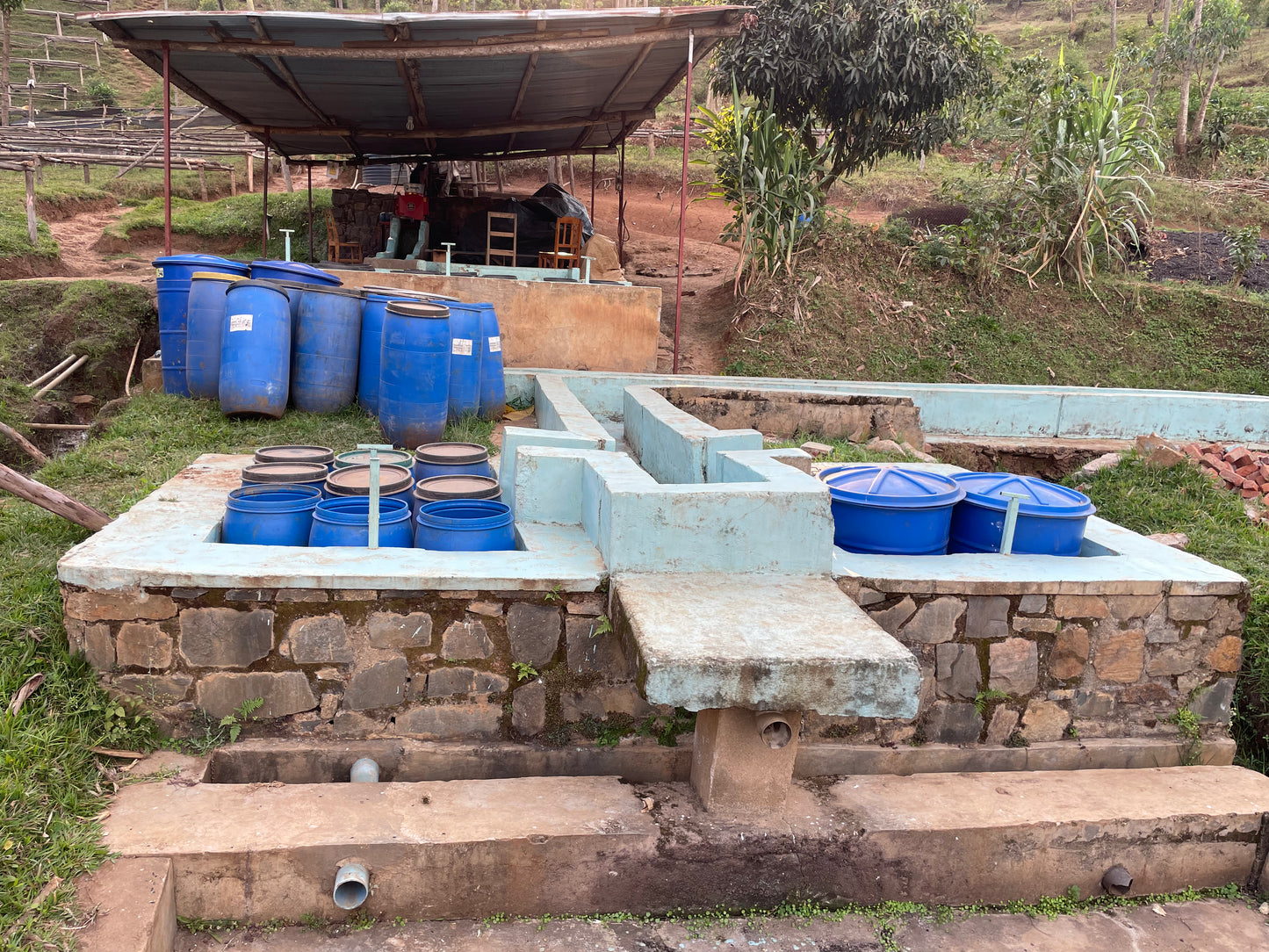Rwanda | Nyamasheke + Nyaruguru | Ukuri | Anaerobic Natural
Rwanda | Nyamasheke + Nyaruguru | Ukuri | Anaerobic Natural
Couldn't load pickup availability
Flavour Notes
Blueberry Jam, Stone Fruit, Cocoa
Key Specs
Variety: Red Bourbon
Process: Anaerobic Natural
Fermentation Time: 72 hours in sealed plastic barrels under shade
Drying Time: 35 to 40 days
Altitude: 1500 to 1850 masl
Harvest: March to June 2024
Drying Method: Raised beds with ambient shaded drying
Average Farm Size: 15.4 hectares
Washing Stations: Ngoma and Akagera
Region: Nyamasheke District in Western Province and Nyaruguru District in Southern Province, Rwanda
Farmers:
Kayitera Stanislas
Karera Gratien
Bangambiki Felcien
Ruberakurora Zabron
Habanabakize Thomas
Rusingizandekwe Frodurad
Rwarahoze Thadee
Nkejuwimye Gratien
Ngendabanyika Japhet
Nukuri Pierre
Nirere Valens
Bimenyande Innocent
Singirankobo Gratien
Bisine Abel
Mukandasongerwa Annoncita
Nahimana
Baratsikimba Gratien
Mukanyangezi Athanasie
Roast Level: Medium Light
Importer: Semilla Coffee
About Ukuri
Ukuri means truth in Kinyarwanda
This lot is a post-harvest blend of two deliveries, processed the same way but at different stations. Once dried and milled, they were brought together by Emmanuel at Baho Coffee. It’s not a move that aligns with typical specialty microlot standards — which often prioritize extreme traceability and separation — but the result was too good to ignore.
The sample came late in the season, and once tasted, it immediately made its way into the lineup. Ukuri is Emmanuel’s quiet challenge to some of specialty coffee’s unspoken rules. His perspective is that Rwandan coffee doesn’t need to be dissected to be exceptional — it already is.
Processing Details
Both lots went through the same method at Akagera and Ngoma. Cherries were delivered to the station, floated in water, and hand sorted to remove underripe or damaged fruit. Once cleaned, they were sealed into plastic barrels for anaerobic fermentation.
Clay pots filled with water — ten percent of the total cherry volume — were placed inside the barrels to help regulate temperature and oxygen levels. The barrels were stored under shade and rotated periodically to keep the fermentation even and consistent. After 72 hours, the cherries were moved to raised beds to dry slowly over 35 to 40 days.
Once dried, the coffee was milled, sorted, and blended prior to export.
This style of anaerobic natural is one Emmanuel has refined over time. While it might be uncommon for Rwanda, it’s handled with great care — resulting in clarity and complexity without overpowering the cup.
About the Washing Stations
Akagera
Located between Lake Kivu and Nyungwe Forest in the Nyamasheke District, Akagera is a compact, high-altitude station where around 460 farmers deliver cherry. It was originally managed by the Kobakanya Cooperative but struggled to find market access until Baho stepped in. Since the transition, the station has shifted its focus fully toward specialty production and offers support to contributing producers through guaranteed pricing, seedlings, and training.
Ngoma
Also in Nyamasheke and right on the lakefront, Ngoma is visually stunning and highly selective. With 780 contributing farmers, it’s still one of Baho’s smallest operations and plays a major role in Rwanda’s coffee appellation project. Coffees from Ngoma are known for florality and structure, with a reputation that includes top placements in Cup of Excellence.
About Baho Coffee
Baho Coffee was founded by Emmanuel Rusatira after nearly two decades of managing washing stations across Rwanda. He built Baho to reflect his own vision — one centered on long-term farmer relationships, sustainable practices, and the space to explore new processing methods.
At each of Baho’s six stations, Emmanuel puts a huge emphasis on education and community building. His Farmer Field Schools train local representatives in selective harvesting, soil management, and water conservation. That knowledge is then brought back to neighboring producers. He also provides seedlings, offers loans for farm infrastructure, and consistently pays above-national farmgate prices — not as a premium for quality, but as a baseline for dignity.
While Rwanda is still heavily shaped by large multinational buyers, Baho stands apart. It’s one of the few Rwandese-owned exporters in the country, meaning the profits stay local and continue to be reinvested in the communities that grow the coffee.
About Semilla Coffee
Semilla Coffee is the importer who helped make this coffee available. Their model is rooted in long-term, relationship-based sourcing with producers who often exist outside of traditional specialty coffee networks. They prioritize transparency, deep traceability, and buying from producers who typically lack access to global markets. In Rwanda, Semilla has partnered closely with Emmanuel and Baho Coffee for several seasons, supporting their work and sharing their coffees with roasters who care about the full story behind the cup.
Bag Size: 300g
Share










































